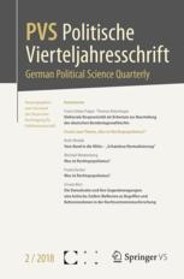No Defenseless Scapegoats! Blame Avoidance Strategies of International Organizations
by Tim Heinkelmann-Wild and Bernhard Zangl
 How do international organizations (IOs) react to the blame of their member states? Research often depicts IOs as good scapegoats for their member states’ blame shifting when their policies fail because they do not have the need, ability or willingness to defend themselves. We argue, however, that IO representatives try to avoid blame for failed policies in public. IOs are thus not passive blame takers, but active blame avoiders. In some cases, they are willing to ignore the blame of their member states, but in other cases they try to blur their own responsibility or even attack the member states. To explain this, we develop a theory of blame avoidance by IOs and argue that the authority of an IO determines which blame avoidance strategy IO representatives adopt. Depending on whether the authority an IO exercises is intergovernmental, supranational or hybrid in the respective policy field, its administration will react to blame from its member states through strategies of ignoring, blurring or attacking. We demonstrate the plausibility of our theory by means of a media content analysis of the European Commission’s responsibility attributions for three contested EU migration policies. We thereby contribute to a better understanding of IO s’ blame avoidance strategies.
How do international organizations (IOs) react to the blame of their member states? Research often depicts IOs as good scapegoats for their member states’ blame shifting when their policies fail because they do not have the need, ability or willingness to defend themselves. We argue, however, that IO representatives try to avoid blame for failed policies in public. IOs are thus not passive blame takers, but active blame avoiders. In some cases, they are willing to ignore the blame of their member states, but in other cases they try to blur their own responsibility or even attack the member states. To explain this, we develop a theory of blame avoidance by IOs and argue that the authority of an IO determines which blame avoidance strategy IO representatives adopt. Depending on whether the authority an IO exercises is intergovernmental, supranational or hybrid in the respective policy field, its administration will react to blame from its member states through strategies of ignoring, blurring or attacking. We demonstrate the plausibility of our theory by means of a media content analysis of the European Commission’s responsibility attributions for three contested EU migration policies. We thereby contribute to a better understanding of IO s’ blame avoidance strategies.
"Nicht nur wehrlose Sündenböcke! Schuldvermeidungsstrategien internationaler Organisationen" [No Defenseless Scapegoats! Blame Avoidance Strategies of International Organizations]. In: Politische Vierteljahresschrift. https://doi.org/10.1007/s11615-020-00255-1.

